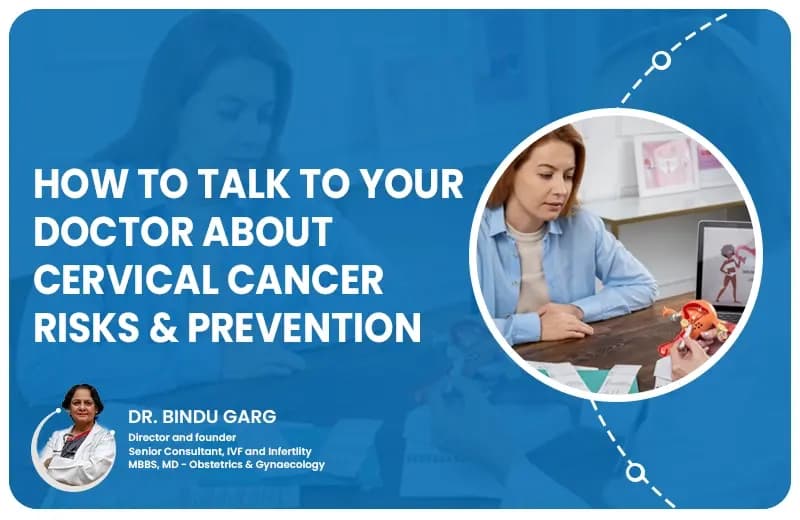
How to Talk to Your Doctor About Cervical Cancer Risks and Prevention
Cervical cancer is one of the most common cancers in women worldwide, but the good news is that it is preventable and treatable if caught early. An important aspect of preventing cervical cancer is to have open communication with your healthcare provider.
However, many women are unsure how to bring up the topic of cervical cancer risk and prevention during their medical appointments. If you are unsure about how to talk to your doctor about cervical cancer or what questions to ask, this blog is for you.
Understanding the importance of discussing risks, screening options, and preventive measures is vital to your health. By addressing these concerns with your doctor, you can take the necessary steps to reduce your chances of developing cervical cancer.
This blog will tell you how to talk about this topic with your healthcare provider, provide essential information about cervical cancer risks, and explain preventive measures like Pap smears, HPV vaccination, and lifestyle changes. We'll also cover your common questions, so you can leave your appointment feeling empowered and informed.
Keep reading to learn why it's important to discuss cervical cancer with your doctor and how to do it with confidence.
Why Should You Talk to Your Doctor About Cervical Cancer?
Cervical cancer is linked to the human papillomavirus (HPV), a common virus that most commonly affects sexually active individuals. HPV infection can cause abnormal cell changes in the cervix, which can develop into cervical cancer if not detected and treated in time. Early detection, through regular screenings such as Pap smears and HPV tests, can help identify these changes before they turn into cancer.
Having an open discussion with your doctor helps you stay informed about these risks and helps you take control of your health. Your healthcare provider can guide you in choosing the best preventive options for you based on your age, sexual history, and other risk factors. Whether you're at high risk or just want to stay ahead of potential health problems, these conversations are important.
Related:- Cervical Cancer
Common Risk Factors for Cervical Cancer
Understanding the risk factors for cervical cancer is essential to determine your level of risk and what preventive measures you should take. Some of the most common risk factors include:
- HPV Infection: Most cervical cancers are caused by persistent HPV infection, especially strains 16 and 18.
- Multiple Sexual Partners: Having more than one sexual partner increases the risk of HPV infection.
- Weakened Immune System: Conditions that weaken the immune system, such as HIV/AIDS or immunosuppressant medications, may increase the risk of cervical cancer.
- Smoking: Smoking weakens the immune system and makes the body less able to fight off HPV infection.
- Age: Cervical cancer is most commonly diagnosed in women over the age of 30, although it can occur at any age.
Talking to your doctor will help you understand how your lifestyle, sexual history, and family health history contribute to these risks.
How to Approach the Topic with Your Doctor
Many women feel uncomfortable discussing their risks for cervical cancer, but it's important to discuss these topics to ensure the best possible care. Here are some tips on how to talk to your doctor:
- Prepare Questions: Before your appointment, write down all your questions or concerns. For example:
- "Am I at risk for cervical cancer based on my lifestyle or family history?"
- “When should I start getting Pap smear tests and how often should I get them done?”
- “What can I do to reduce my risk of cervical cancer?”
- Be Honest: Share your full sexual history, any history of STDs, and any relevant family health information. This helps your doctor more accurately assess your risk.
- Ask About Preventive Measures: Discuss vaccination options (such as the HPV vaccine) and the importance of regular screenings.
- Don’t Be Afraid to Ask for Clarity: If you do not understand something the doctor says, ask him to explain it in simple terms.
What Are the Screening Options for Cervical Cancer?
Regular screening is important to prevent and detect cervical cancer early. The two most common screening tests include:
- Pap Smear (Pap Test): This test checks for abnormal cells in the cervix that may develop into cancer. It is usually recommended starting at age 21 and should be repeated every three years, depending on your doctor's advice.
- HPV Test: This test checks for the presence of high-risk HPV types that can cause cervical cancer. It is often combined with a Pap smear for women over the age of 30.
Your doctor may recommend these tests at different intervals depending on your age, medical history, and risk factors.
Preventive Measures to Reduce Cervical Cancer Risks
There are several preventive measures you can take to reduce your risk of cervical cancer:
- HPV Vaccination: The HPV vaccine protects against the most common cancer-causing types of HPV. It's recommended for both boys and girls from the age of 11 or 12, but adults can also get vaccinated up to the age of 26.
- Quit Smoking: Smoking increases the risk of cervical cancer. Quitting smoking can reduce your chances of getting this disease.
- Use Protection During Sex: Consistent condom use can protect against HPV and other sexually transmitted infections that increase the risk of cervical cancer.
- Regular Screenings: As mentioned, regular Pap smears and HPV testing are important for early detection of abnormalities.
- Healthy Lifestyle: Eating a balanced diet, exercising regularly, and maintaining a healthy weight can help strengthen your immune system and reduce your risk of developing cancer.
Related:- Pap Test for Cervical Cancer
People Also Ask: Common Questions About Cervical Cancer
Q1. At what age should I start getting Pap smears?
The American Cancer Society recommends starting Pap smear tests at age 21. Your doctor will advise you about frequency based on your age and risk factors.
Q2. Can HPV be cured?
There's no cure for HPV, but in most cases, the body can clear the infection on its own. If left untreated, some strains can lead to cervical cancer.
Q3. What are the symptoms of cervical cancer?
Early cervical cancer often has no symptoms. As the disease progresses, symptoms may include abnormal vaginal bleeding, pelvic pain, and pain during intercourse.
Q4. How often should I get an HPV test?
Women over the age of 30 should get an HPV test along with a Pap smear every five years or as recommended by a doctor.
Q5. Is the HPV vaccine safe?
Yes, the HPV vaccine is safe and highly effective in preventing HPV-related cancers, including cervical cancer.
Conclusion: Empower Yourself by Talking to Your Doctor
Cervical cancer is preventable and treatable if caught early. You can take proactive steps to protect your health by talking openly with your doctor about cervical cancer risk and prevention. Don't hesitate to ask questions, understand your risks and explore preventive measures. Your doctor is there to help you make informed decisions and keep you healthy. Stay informed, be proactive and make your health a priority.
Content Created By:

CyberBizz Technologies
Team - Content Curator